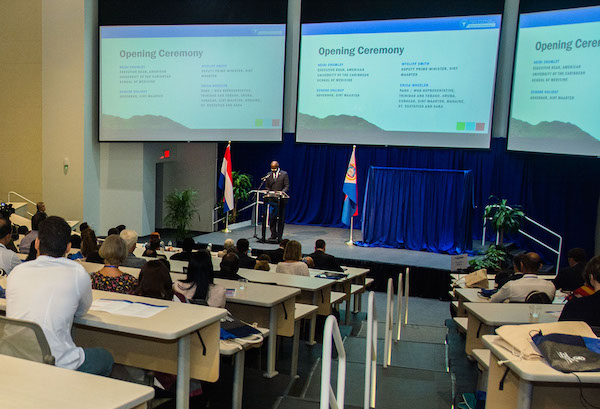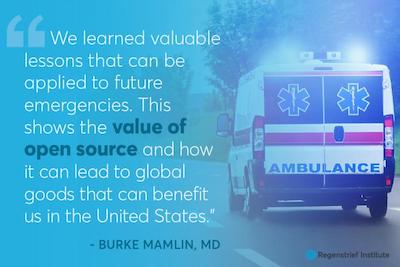Emergency Medical Services (EMS)
See the following -
2019 International Conference on Disaster Medicine and Hurricane Resiliency Draws Hundreds
 More than 280 healthcare professionals, emergency preparedness experts, and government leaders gathered on campus March 8-11 with the goal of uniting their collective experience and expertise to increase their communities’ ability to manage hurricanes and other disasters. Attendees represented 12 countries, including 9 Caribbean islands, and a multitude of backgrounds in disaster preparedness and response, including disaster medicine and veterinary medicine, nursing, hospital administration, mental health, telehealth, EMS and first responders, disaster recovery and humanitarian assistance, medical education, and more.
More than 280 healthcare professionals, emergency preparedness experts, and government leaders gathered on campus March 8-11 with the goal of uniting their collective experience and expertise to increase their communities’ ability to manage hurricanes and other disasters. Attendees represented 12 countries, including 9 Caribbean islands, and a multitude of backgrounds in disaster preparedness and response, including disaster medicine and veterinary medicine, nursing, hospital administration, mental health, telehealth, EMS and first responders, disaster recovery and humanitarian assistance, medical education, and more.
- Login to post comments
Emergency Open Source EMR Created In A Week To Respond To Covid-19 Crisis
 A team from Regenstrief Institute leveraged OpenMRS, a global open-source electronic medical record (EMR), to create an emergency EMR for Indianapolis first responders preparing for a possible influx of COVID-19 patients. This process was completed in a week to allow Indianapolis Emergency Medical Services (IEMS) to register patients, collect basic clinical information, and send these encounters to Indiana's health information exchange, a crucial element to help the response to the COVID-19 pandemic...This work demonstrates that it is possible to leverage existing tools to create EMRs in emergency situations to improve crisis response. "We learned valuable lessons from this experience that can be applied to future emergencies. This system can be adapted to work in other states or even countries, and it can be done very quickly," said Burke Mamlin, M.D., a project leader and member of Regenstrief's Global Health Informatics program. "This shows the value of open source and how it can lead to global goods that can benefit us in the United States."
A team from Regenstrief Institute leveraged OpenMRS, a global open-source electronic medical record (EMR), to create an emergency EMR for Indianapolis first responders preparing for a possible influx of COVID-19 patients. This process was completed in a week to allow Indianapolis Emergency Medical Services (IEMS) to register patients, collect basic clinical information, and send these encounters to Indiana's health information exchange, a crucial element to help the response to the COVID-19 pandemic...This work demonstrates that it is possible to leverage existing tools to create EMRs in emergency situations to improve crisis response. "We learned valuable lessons from this experience that can be applied to future emergencies. This system can be adapted to work in other states or even countries, and it can be done very quickly," said Burke Mamlin, M.D., a project leader and member of Regenstrief's Global Health Informatics program. "This shows the value of open source and how it can lead to global goods that can benefit us in the United States."
- Login to post comments
Funding Opportunities for Building Data Connections Between EMS and Healthcare Partners
 EMS providers often treat patients with complicated medical histories yet have no access to relevant health data, such as hospital or out-patient records, which might provide information critical to patient care. EMS reports also are rarely integrated into hospital records, leaving specialists and other hospital staff unaware of how patients presented to EMS initially and what treatments they received prior to arriving at the emergency department...Earlier this year, the Centers for Medicare & Medicaid Services (CMS) published a guidance letter that allows the use of Health Information Technology for Economic and Clinical Health (HITECH) funds for expenditures related to electronically connecting Eligible Providers to other Medicaid providers, including EMS, to share health information.
EMS providers often treat patients with complicated medical histories yet have no access to relevant health data, such as hospital or out-patient records, which might provide information critical to patient care. EMS reports also are rarely integrated into hospital records, leaving specialists and other hospital staff unaware of how patients presented to EMS initially and what treatments they received prior to arriving at the emergency department...Earlier this year, the Centers for Medicare & Medicaid Services (CMS) published a guidance letter that allows the use of Health Information Technology for Economic and Clinical Health (HITECH) funds for expenditures related to electronically connecting Eligible Providers to other Medicaid providers, including EMS, to share health information.
- Login to post comments
Why We Need Trauma Trained Educators for National and Regional Disaster Response Teams
 Lately, I have been dealing on a number of fronts with natural disasters, and how to help schools and their educators can best deal with their aftermath. At the same time, I have been listening to and learning about disaster team efforts across our nation (from across state and federal government), teams that are dealing with the treacherous aftermath of person-made calamities (floods, fires, shootings, hurricanes, tornados, bombs and car/truck intentional crashes). When Veteran hospitals and facilities are at risk, the Department of Veterans Affairs offers their added expertise too.
Lately, I have been dealing on a number of fronts with natural disasters, and how to help schools and their educators can best deal with their aftermath. At the same time, I have been listening to and learning about disaster team efforts across our nation (from across state and federal government), teams that are dealing with the treacherous aftermath of person-made calamities (floods, fires, shootings, hurricanes, tornados, bombs and car/truck intentional crashes). When Veteran hospitals and facilities are at risk, the Department of Veterans Affairs offers their added expertise too.
- Login to post comments